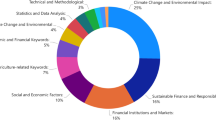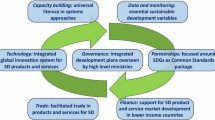Abstract
Purpose of Review
The goal of the case study is to provide an outline of the “governance” group’s approach to conducting research on nexus issues in this case study.
Recent Findings
A significant part of the Texas A&M Water-Energy-Food Nexus initiative focuses on issues of governance and public policy. The governance and public policy element of this initiative represents one potentially unique contribution to the applied scholarship on nexus issues writ large.
Summary
Both as a significant research project in its own right, and as a proof-of-concept effort, the initiative has decided to engage in a significant collaborative research project centered on a San Antonio Region Case Study.
Similar content being viewed by others
References
Papers of particular interest, published recently, have been highlighted as: • Of importance •• Of major importance
Ansell C, Gash A. Collaborative governance in theory and practice. J Public Adm Res Theory. 2008;18(4):543–71.
Berardo R, Olivier T, Lavers A. Focusing events and changes in ecologies of policy games: evidence from the Paraná River Delta. Review of Policy Research. 2015;32(4):443–64.
Berardo R, Lubell M. Understanding what shapes a polycentric governance system. Public Adm Rev. 2016;76(5):738–51.
Feiock RC. The institutional collective action framework. Policy Studies Journal. 2013;41(3):397–425.
Feiock RC, Steinacker A, Park HJ. Institutional collective action and economic development joint ventures. Public Adm Rev. 2009;69(2):256–70.
Jasny L, Lubell M. Two-mode brokerage in policy networks. Soc Networks. 2015;41:36–47.
Klibanoff P, Morduch J. Decentralization, externalities, and efficiency. Rev Econ Stud. 1995;62(2):223–47.
•• Kurian M. The water-energy-food nexus: trade-offs, thresholds and transdisciplinary approaches to sustainable development. Environ Sci Policy. 2017;68:97–106. This very important paper examines the role of science and scientific information in governance of the water-energy-food nexus. Using wastewater reuse as a specific example, the results indicate that the development of the “nexus observatory” approach to measuring aspects of the water-energy-food nexus can serve as the foundation for improved coordination in the governance of the nexus.
Kurian M, Portney KE, Rappold G, Hannibal B, Gebrechorkos SH. Governance of water-energy-food nexus: a social network approach. Position paper for the Water, Soil, and Waste Dresden Nexus Conference. Dresden, GR: United Nations University-Flores. 2017. Available at: https://express2.converia.de/frontend/converia/media/DNC_2017/Position_Papers/DNC2017_PP_Kurian_et_al_Governance_of_WEF_Nexus.pdf, last accessed June 21, 2017.
Leach WD, Pelkey NW, Sabatier PA. Stakeholder partnerships as collaborative policymaking: evaluation criteria applied to watershed management in California and Washington. Journal of Policy Analysis and Management. 2002;21(4):645–70.
Lubell M. Governing forum complexity: the ecology of games framework. Policy Studies Journal. 2013;41(3):537–59.
Lubell M, Henry AD, McCoy M. Collaborative forums in an ecology of games. Am J Polit Sci. 2010;54(2):287–300.
Lubell M, Mewhirter J, Berardo R, Scholz JT. Transaction costs and the perceived effectiveness of complex institutional systems. Public Administration Review, online first. 2017; doi:10.1111/puar.12622.
Lubell M, Robbins G, Wang P. Policy coordination in an ecology of water management games. Paper 22. 2011. Available at http://opensiuc.lib.siu.edu/pnconfs_2011/22.
•• Lubell M, Robins G, Wang P. Network structure and institutional complexity in an ecology of water management games. Ecol Soc. 2014;19(4):23–36. This very important paper provides the framework for analyzing policymaking institutions and organizations with social network analysis and uses information from a survey of 387 people involved in water management in the San Francisco Bay Area.
Madani K, Lund JR. California’s Sacramento–San Joaquin Delta conflict: from cooperation to chicken. J Water Resour Plan Manag. 2011;138(2):90–9.
Mewhirter J, Berardo R, Lubell M. Policy influence across multiple forums in complex policy networks. Paper delivered at the 2017 Meetings of the Southern Political Science Association, New Orleans, LA, January 13 2017.
O'Toole LJ, Meier KJ. Modeling the impact of public management: implications of structural context. J Public Adm Res Theory. 1999;9(4):505–26.
O’Toole LJ. Treating networks seriously: practical and research-based agendas for public administration. Public Adm Rev. 1997;57(1):45–52.
Sabatier PA. An advocacy coalition framework of policy change and the role of policy-oriented learning therein. Policy Sci. 1988;21(2):129–68.
• Scholz JT, Berardo R, Kile B. Do networks solve collective action problems? Credibility, search, and collaboration. J Polit. 2008;70(2):393–406. This paper empirically examines the link between different kinds of governance networks and propensity to cooperate to solve collective action problems in the National Estuary Program.
Scholz JT, Wang C-L. Cooptation or transformation? Local policy networks and federal regulatory enforcement. Am J Polit Sci. 2006;50(1):81–97.
Smaldino PE, Lubell M. Forums and cooperation in an ecology of games. Artificial Life. 2014;20(2):207–21.
Acknowledgments
This research was supported by the Texas A&M WEF Nexus initiative.
Author information
Authors and Affiliations
Corresponding author
Ethics declarations
Conflict of Interest
The authors declare that they have no conflicts of interest.
Human and Animal Rights and Informed Consent
This article does not contain any studies with human or animal subjects performed by any of the authors.
Additional information
This article is part of the Topical Collection on Nexus of Food, Water, Energy
Rights and permissions
About this article
Cite this article
Portney, K.E., Vedlitz, A., Sansom, G. et al. Governance of the Water-Energy-Food Nexus: the Conceptual and Methodological Foundations for the San Antonio Region Case Study. Curr Sustainable Renewable Energy Rep 4, 160–167 (2017). https://doi.org/10.1007/s40518-017-0077-1
Published:
Issue Date:
DOI: https://doi.org/10.1007/s40518-017-0077-1




